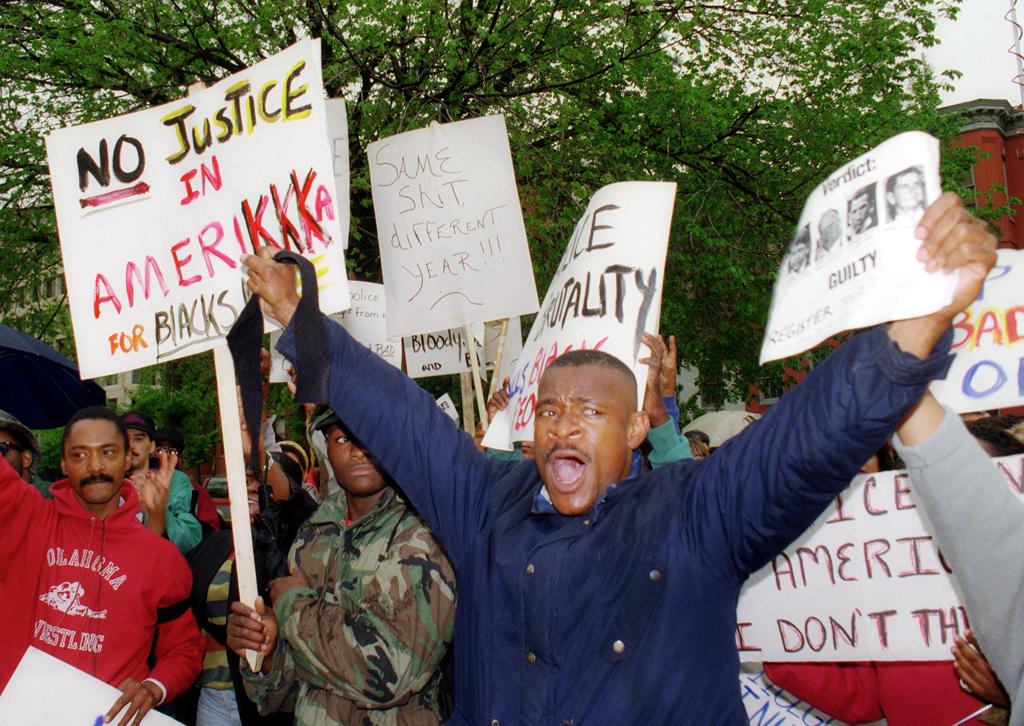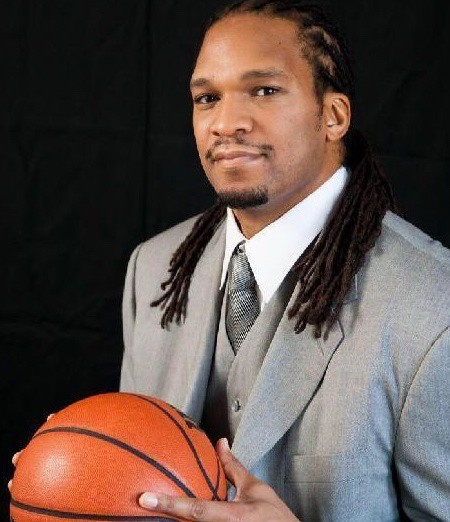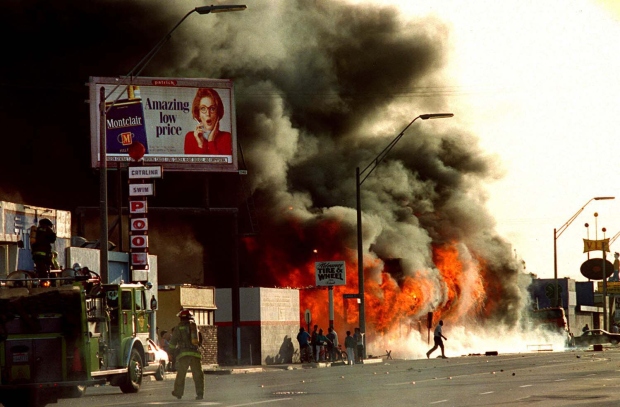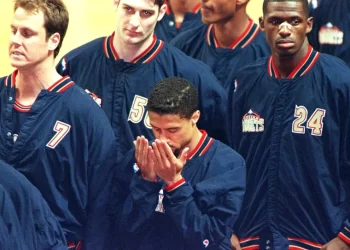By: Zachary Draves
It all began with an act of state violence caught on tape and ended with one of the most infamous riots/rebellions in American History.
Thirty years ago, the world was stunned at the news that four white LAPD officers were acquitted in the beating of black motorist Rodney King, who was twenty five at the time. A year prior, King was pulled over by the LAPD after a high speed chase on LA’s Foothill Freeway and was subsequently beaten by the officers in which the entire incident was caught on tape by a resident at a nearby apartment complex.

(Courtesy: Berkley News, University of California Berkley)
The beating sparked outrage across the country but for many in the African American community, it was nothing new, particularly in Los Angeles which has a notorious history of police brutality and racism dating back to the days of Chief William Parker in the 1960’s.

(Courtesy: Paul J. Richards)
The four officers went on trial and on April 29, 1992 they were found not guilty on all charges and the people did not take that lying down. What followed was four days of riots, rebellions, looting, and violence that left 63 people dead, more than $1 billion in property damage, and a nation on the brink.
:quality(70)/cloudfront-us-east-1.images.arcpublishing.com/tronc/66BJX36V55CRXMANF772HECQPQ.jpg)
(Courtesy: Kirk McKoy / Los Angeles Times)
During that period and ultimately prior, some in the culture, most notably in hip hop, used their megaphone to sound the alarm on the increasing problem of police brutality. Artists and groups such as NWA, Public Enemy, Ice T, and Ice Cube after he broke off with NWA were among the loudest voices speaking truth to power, but their voices much like those of the communities they represented were forgotten.

(Courtesy: Youtube)
The sports world remained largely neutral if not silent with a few notable exceptions such as Chicago Bulls guard and three point champion Craig Hodges, whom the year before, had encouraged both Magic Johnson and Michael Jordan to boycott the 1991 NBA Finals in response to the King beating, which was quickly shut down.

(Courtesy: NATHANIEL S. BUTLER/NBAE VIA GETTY IMAGES)
In the midst of the riots, teams canceled games but didn’t, as we might expect them to do in the present, put out a statement condemning the actions of the officers and the outcome of the trial. An ethos that was emblematic of that particular era of sports in which money and endorsements ruled the day and stifled any political or social activism.
Remember Michael Jordan saying “Republicans buy sneakers too”?
Former athletes such as Jim Brown, known for his activism in the 1960’s, organized his Amer-I-Can foundation to create a united front between LA’s most notorious street gangs The Bloods and The Crips and helped to turn many lives around in the process.
It was also during that time that a young man in Tulsa, Oklahoma named Etan Thomas, who would go on to be an NBA player in the early and late 2000s, was bearing witness to the turmoil first hand in his own world.
“I remember then hearing the verdict and all the officers were found not guilty and my middle school was about to erupt.” said.
“I think they sent everybody home and I think a white kid made a joke that spread around the school very quickly and they sent everyone home.”
Etan spoke of how the verdict shaped him in many ways and was a catalyst for what would become his life’s work.
He eventually made it to the NBA playing for the Washington Wizards and the Oklahoma City Thunder while also having a strong social conscience and a willingness to speak his mind on pressing matters of social justice.
/cdn.vox-cdn.com/uploads/chorus_image/image/66982223/112890486.jpg.0.jpg)
(Courtesy: Harry E. Walker/MCT/Tribune News Service via Getty Images)
A priority he maintains to this day and has demonstrated in his two recent books We Matter: Athletes and Activism and Police Brutality and White Supremacy: The Fight Against American Traditions, which is a collection of the thoughts and feelings of athletes, artists, activists, and families affected by police violence, among them were Rodney King’s daughter Lora.

(Courtesy: Etan Thomas)
“She is talking about the fact that people don’t understand the pain, torment, and struggle that Rodney King went through after that happened” he said.
“She is talking about it from the standpoint as a little girl watching her father completely change and how he had to have complete reconstructive surgery of his entire face.”
Fast forward to the present day and athletes are more outspoken than ever on matters of social justice and social media has played a significant role in amplifying the voices of athletes. Certainly the summer of 2020 with the murders of George Floyd, Breonna Taylor, and Ahmaud Arbery plus the shooting of Jacob Blake was the turning point when athletes, much like many in the pursuit for long overdue remedies to structural racism, said enough was enough.
The question always begs will that continue so that we don’t repeat history?
Etan remains hopeful.
“That is what I am pushing for. That is what I am always talking about in showing the power of athletes” he said.
“When you have an athlete making you feel supported and that your life actually matters, it brings attention to it”.
Rodney King passed away in 2012 but his name will never be forgotten and nor will the work of addressing systemic injustice ever stop no matter how hard some may try to do so.
30 years later, have we learned any lessons?
I personally don’t know but what I can say is that the next time somebody sounds the alarm we have to listen before it’s too late.
We should have been paying attention to NWA, we didn’t, and look what happened.
We should have been paying attention to Colin Kaepernick, we didn’t, and look what happened.
Never forget.


 NFL
NFL






